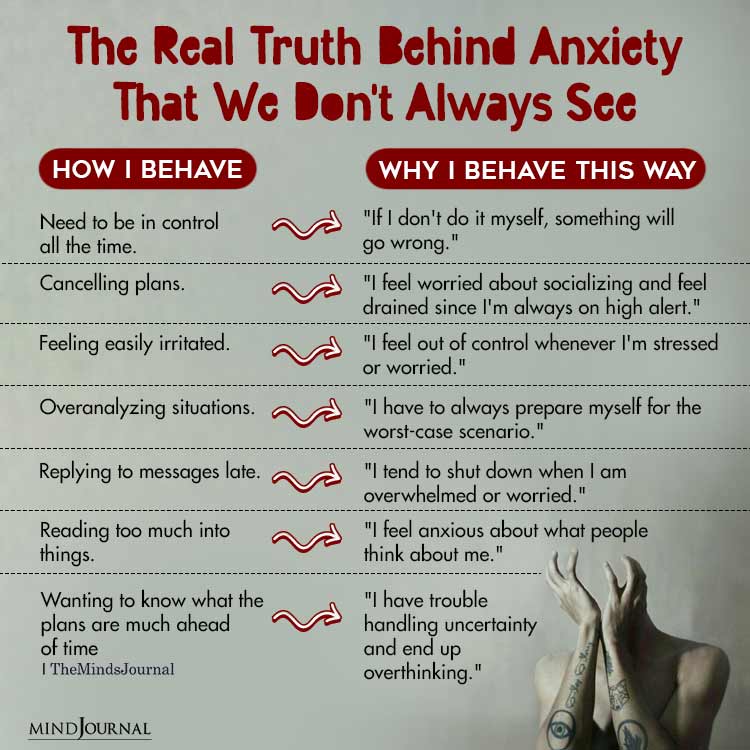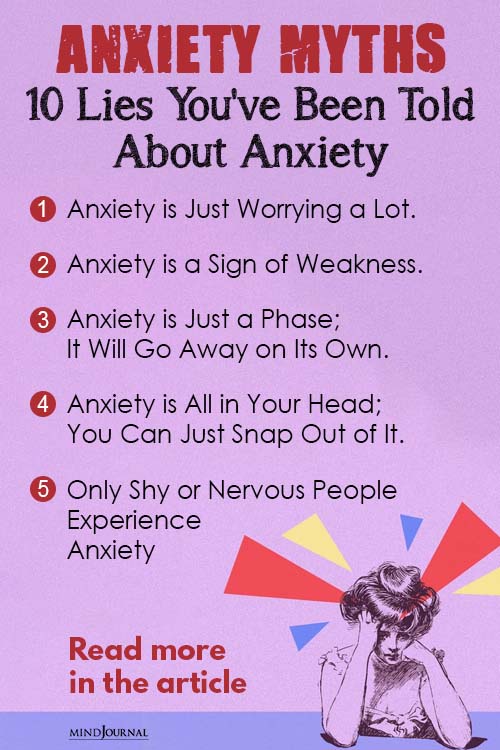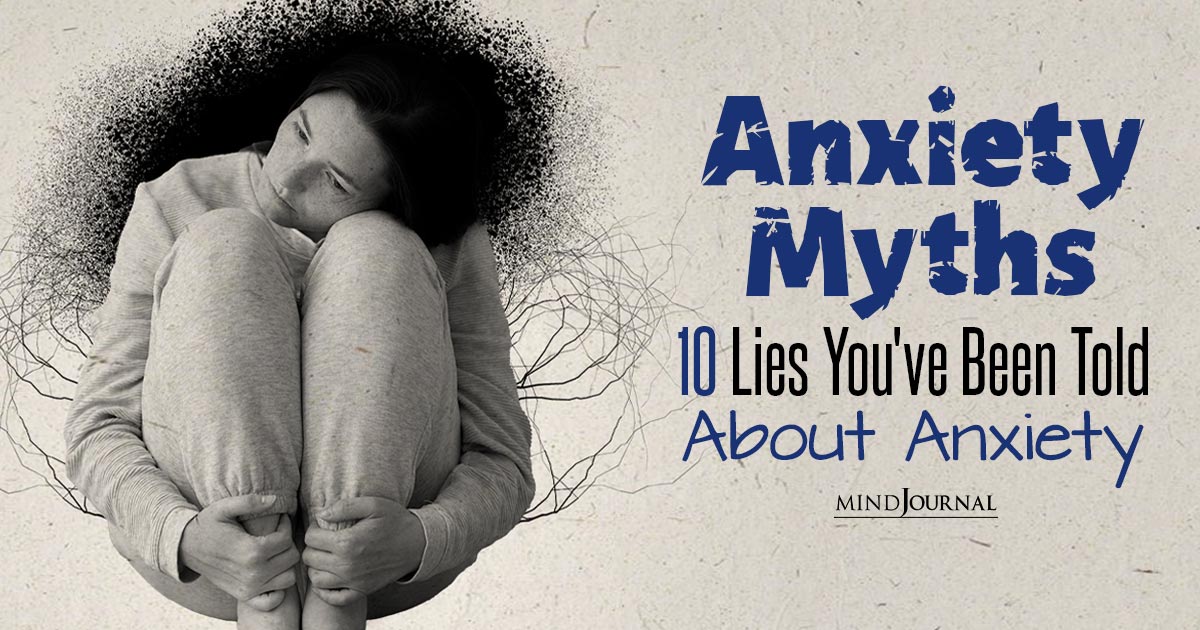Do you often feel anxious or have worries that seem to consume your thoughts? If so, you may be suffering from anxiety. Unfortunately, anxiety is often misunderstood, leading to the perpetuation of various anxiety myths and misconceptions.
Anxiety is a common experience that affects millions of people worldwide. Today, let us delve into the realm of anxiety myths, debunking them one by one to shed light on the truth behind these widely held misconceptions.
So, let’s embark on this journey together and challenge our preconceived notions about anxiety.
9 Anxiety Myths You Must Know About
Ready to debunk common misconceptions about anxiety? Let’s explore nine prevalent anxiety myths to gain clarity and feel less anxious by understanding this complex mental health condition.
Myth #1: Anxiety is Just Worrying a Lot

Anxiety is often oversimplified as mere excessive worrying. While worrying can be a part of anxiety, it is crucial to understand that anxiety extends beyond everyday concerns.
Anxiety is a complex mental health condition characterized by persistent and overwhelming feelings of fear, uneasiness, and apprehension. It can manifest physically, emotionally, and cognitively, influencing various aspects of an individual’s life.
Related: What Concealed Anxiety Actually Feels Like
Myth #2: Anxiety is a Sign of Weakness
One of the most damaging misconceptions about anxiety is the notion that it is a sign of weakness or lack of resilience. This misconception not only stigmatizes individuals with anxiety but also discourages them from seeking help and support.
In reality, anxiety is not a reflection of weakness but a legitimate medical condition caused by a combination of genetic, environmental, and neurological factors. It takes strength and courage to confront and manage anxiety.
Myth #3: Anxiety is Just a Phase; It Will Go Away on Its Own
Another prevalent myth is that anxiety is a temporary phase that will naturally fade away over time. While anxiety symptoms may fluctuate, it is essential to recognize that anxiety disorders are chronic conditions that require proper management and treatment.
Ignoring or dismissing anxiety can perpetuate its negative impact on an individual’s mental and physical well-being. Seeking professional help and adopting coping strategies is crucial for effectively managing anxiety.
Myth #4: Anxiety is All in Your Head; You Can Just Snap Out of It
Anxiety is often dismissed as a figment of one’s imagination, implying that individuals can simply “snap out of it” if they try hard enough. However, anxiety is a complex interplay of biological, psychological, and environmental factors.
It involves intricate changes in brain chemistry and neural pathways, making it far from something one can easily control or overcome with willpower alone. It is essential to approach anxiety with empathy and understanding, recognizing its profound impact on individuals’ lives.
Myth #5: Only Shy or Nervous People Experience Anxiety
This is one of the most prevalent anxiety myths. But contrary to popular belief, anxiety is not limited to shy or nervous individuals. While some people may have a predisposition to anxiety due to personality traits, anxiety disorders can affect anyone, regardless of their outward demeanor.
Anxiety does not discriminate based on personality type or social preferences. It is a condition that can affect people from all walks of life, highlighting the need for compassion and support for those grappling with anxiety.

Myth #6: Medication is the Only Solution for Anxiety
There is a misconception that medication is the sole solution for managing anxiety. While medication can be a valuable tool in anxiety treatment, it is not the only option. Anxiety management is a multidimensional process that may involve a combination of therapies, lifestyle changes, and self-care practices.
Cognitive-behavioral therapy (CBT), relaxation techniques, exercise, mindfulness, and support networks are just a few examples of non-pharmacological approaches that can effectively help you feel less anxious and alleviate anxiety symptoms.
Related: What Is Relationship Anxiety? Signs, Causes, & How To Overcome
Myth #7: Anxiety Is Not a Serious Condition
Anxiety disorders are often trivialized as a minor inconvenience or a normal part of everyday life. However, anxiety can profoundly impact an individual’s quality of life and functioning. It can interfere with work, relationships, and overall well-being.
Untreated anxiety can lead to a variety of complications, including panic attacks, depression, substance abuse, and physical health issues. Recognizing the seriousness of anxiety is crucial in promoting early intervention and appropriate support.
Myth #8: Children Can’t Experience Anxiety
Anxiety is not limited to adults; children can also experience anxiety disorders. However, anxiety symptoms in children may manifest differently compared to adults.
Instead of expressing their fears and worries explicitly, children may exhibit signs such as restlessness, trouble sleeping, irritability, and physical complaints like headaches or stomach aches.
Identifying and addressing anxiety in children is vital to support their emotional well-being and prevent long-term consequences.
Myth #9: Anxiety Is Untreatable; You Have to Live with It
One of the most disheartening myths surrounding anxiety is the belief that it is untreatable, leaving individuals feeling helpless and resigned to a life of perpetual anxiety. In reality, anxiety is a highly treatable condition.
With the right support, individuals can learn effective coping mechanisms, develop resilience, and regain control over their lives. Therapeutic interventions, such as cognitive-behavioral therapy (CBT), can equip individuals with practical tools to manage anxiety symptoms and reduce their impact on daily functioning.
Takeaway

Anxiety myths can perpetuate misunderstanding, stigma, and hinder individuals from seeking the help they need. By debunking these myths, we can foster a more compassionate and informed society that supports individuals struggling with anxiety.
Remember, anxiety is not a sign of weakness, and it is certainly not something to be dismissed or overlooked. Anxiety is a real and valid experience that deserves understanding, empathy, and appropriate treatment.
Let’s challenge these anxiety myths together, embracing a more accurate and compassionate understanding of anxiety.
Related: 15 Effective Reminders For Anxiety That Will Help Comfort You
Frequently Asked Questions (FAQs):
What are 5 facts about anxiety?
Anxiety, a prevalent mental health disorder, exhibits physical symptoms like rapid heartbeat and sweating, interfering with daily life. Effective treatments include therapy, medication, and lifestyle changes like exercise and stress management.
What is the stereotype of anxiety?
The stereotype of anxiety often portrays individuals as overly nervous, jittery, or constantly on edge.
Can you live a long life with anxiety?
Yes, with proper management and treatment, many people with anxiety can lead fulfilling lives and enjoy longevity.











Leave a Reply